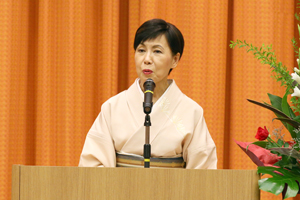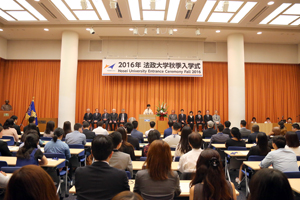Good morning First of all let me congratulate you on entering Hosei University!
Coming to university or graduate school is not just about amassing skills and knowledge. It is about developing a broader and a deeper perspective on what is happening in the world today, and understanding how the world is likely to develop. The sense of values you acquire here at university will help nurture your own individual values and viewpoint.
During its period of rapid economic growth, Japan faced the issue of environmental pollution ahead of other countries, and has since taken various measures to tackle it. Japan is a country that suffers considerable damage from natural disasters such as earthquakes, so it built strict, solid construction regulations. In the wake of the 2011 Fukushima nuclear accident, Japan has started working on reducing its dependence on nuclear power while decommissioning the affected nuclear plants. While the world’s population continues to explode, Japan’s birthrate has dropped, and its population is ageing faster and earlier than any other country. The decline in Japan’s non-urban population is significant, and authorities are devising ways to revitalize regional economies and population base.

As you can see, Japan has faced a range of difficult issues, and worked hard to overcome them. Japan may be experiencing some problems earlier than other countries, but these are common global issues. I would urge you to not only pursue a specific field of study in Japan, but to study Japan itself, and the Japanese language. For this endeavor will help formulate how you see and seek to mold tomorrow’s world.
Hosei University’s Charter emphasizes our role as a university that possesses a broad outlook on the future of Japan, and the world. When you enter Hosei University, your studies will be based on this very same spirit, so let me tell you a little more about it. The Charter’s watchword is “commitment,” or, the “University’s commitment to society.” We call that commitment Practical Wisdom for Freedom.
Hosei University Charter
Practical Wisdom for Freedom
Hosei University was founded by a group of ambitious young men at the beginning of the modern era in Japan for ordinary citizens who had become aware of human rights and sought a knowledge of the law.
As the school song says, Hosei University is a place where “good teachers and good friends gather.” The university has always fostered a “free academic atmosphere” in which the rights of others are respected and diversity is accepted, and a “pioneering spirit” which is not bound by convention and aims at building a fair society.
Carrying on the legacy of the university’s founders, our mission is to pass on this free academic atmosphere and pioneering spirit to the next generation and contribute to solving the problems of the world.
In order to fulfill this mission, the university strives to support farsighted research from a variety of points of view and educate students to become independent citizens who carry out their work for the society and the people based on well-grounded principles and unrestricted thinking.
Hosei University promotes sound critical thinking based on sympathy for all people, both locally and internationally, and the creation of ideas for solving social problems based on practical wisdom. In cooperation with its many graduates, who have the ability to live anywhere in the world, Hosei University will contribute to the future of sustainable societies.
That is the Hosei University Charter.
So what is Practical Wisdom for Freedom?
It refers to the freedom to think for yourself, and to direct your life based on those thoughts and beliefs without relying on authority or organizations you find yourself in. Practical wisdom doesn’t simply mean knowledge with valid practical applications. Practical wisdom is the application of astute intellect to real-life situations to achieve an ideal or a goal that is of value to society. This commitment dates back far into the history of Hosei University.
Hosei University started out in 1880 as the Tokyo School of Law. The Tokyo School of Law was established by three young lawyers in their twenties. It was at the beginning of Japan’s modern era, when the people of the time were just starting to realize the importance of human rights, and the need for legal expertise.
The three lawyers were 28-year-old Kanamaru Magane, 25-year-old Ito Osamu, and 24-year-old Satta Masakuni. The multipurpose Satta Hall, located here on Ichigaya campus, was named after the youngest of the three founders. The 27-floor Boissonade Tower, where we are right now, was named after the French legal scholar Gustave Émile Boissonade de Fontarabie. The three young men studied law based on Boissonade’s legal approach, and this became the foundation of the Tokyo School of Law’s curriculum.
Hosei University is currently playing a key part in the government’s university globalization strategy. Today, Hosei University consistently boasts one of the highest number of students studying overseas among Japanese universities. Many of our graduates also work in various places around the world.
Japan and the rest of the world are currently facing an era of unprecedented change. As for our University founders before us, changing times present opportunities for young people to carve new eras and new priorities. I hope that each of you will take the opportunity to test your own creativity.
I myself first entered Hosei University 46 years ago. I was struck by the teachers’ free academic approach, and the determined attitude to challenge and contribute to society. Universities are not just for academic studies. They are precious places in which to learn about the world, confront social issues, and extend your own faculties and horizons. Hosei University is precisely such a place. In one of my first-year classes, we conducted a field survey with some senior students, and sometimes students themselves even conducted lectures. The professors responded really well when the students tried to take an active part. At Hosei University, students can actually change the lessons themselves, because that is the type of institution we are.
Many professors illustrate the Practical Wisdom for Freedom spirit by cooperating with society on a variety of ongoing projects. We have staff offering personal support for students. The University also encourages students to help each other and act on their own initiative. I hope you will work to extend your own skills, together with others in this precious space of the university. University is the perfect time and place to help each other explore your own capabilities. Truly, there is no other place like it.
Let me close by heartily welcoming you into the Hosei University community.
おはようございます。まず最初に、法政大学への入学を、お祝い申し上げます。
大学や大学院で学ぶ目的は、単に技術や知識を獲得することだけではありません。今の世界で何が起きているか、これからの世界がどうなっていくかを、広い視野で理解することです。そして、大学の掲げている価値観を通して、自らの価値観、思想を鍛えていくことです。
日本は、高度経済成長の時代、いちはやく環境汚染に直面し、その課題に対してさまざまな対応をしてきました。日本は地震などの災害が多く、そのために厳しい建築基準を持っています。また日本は2011年に原子力事故を起こし、今、その廃炉に向かうと同時に、原子力への依存を減らすことを方針にしています。世界の人口はますます多くなっていきますが、日本はどこよりも早く、少子高齢化を迎えました。日本の地域の人口減少や衰退は大きな課題で、地域の活性化は大きな目標です。
このように、日本は様々な課題をもっています。同時に、それを乗り越えるための努力もしてきました。これらの課題は、日本がいち早く体験していますが、世界共通の課題です。ぜひ日本で特定の分野を学ぶだけでなく、日本を学び、日本語も学んで下さい。それは皆さんが今後の世界を考える上での基本になるでしょう。

法政大学は、世界と日本の将来を考える大学として、大学憲章を持っています。法政大学に入学する皆さんも、この憲章の精神のもとで勉学することになりますので、ここで、憲章をご紹介しましょう。まず、この憲章には標語がついています。その標語を「約束」と呼んでいます。社会に対する大学の約束、という意味です。その約束は「自由を生き抜く実践知」です。
法政大学憲章
自由を生き抜く実践知
法政大学は、近代社会の黎明期にあって、
権利の意識にめざめ、法律の知識を求める
多くの市井の人びとのために、
無名の若者たちによって設立されました。
校歌に謳うよき師よき友が集い、
人びとの権利を重んじ、多様性を認めあう「自由な学風」と、
なにものにもとらわれることなく公正な社会の実現をめざす
「進取の気象」とを、育んできました。
建学以来のこの精神を受け継ぎ、
地球社会の課題解決に貢献することこそが、本学の使命です。
その使命を全うすべく、
多様な視点と先見性をそなえた研究に取り組むとともに、
社会や人のために、真に自由な思考と行動を貫きとおす
自立した市民を輩出します。
地域から世界まで、あらゆる立場の人びとへの共感に基づく
健全な批判精神をもち、
社会の課題解決につながる「実践知」を創出しつづけ、
世界のどこでも生き抜く力を有する
あまたの卒業生たちと力を合わせて、
法政大学は持続可能な社会の未来に貢献します。
以上が、法政大学憲章です。「自由を生き抜く実践知」とは何でしょうか?ここでいう自由とは、権威や組織に寄りかからず、自分の力で考え、その考えにもとづいて自分を律して生きることです。実践知とは、実際に役立つ知識というだけの意味ではなく、理想や社会的に価値あるものに向かって、それぞれの現場で発揮する知性のことです。この標語は、法政大学の歴史と深いかかわりがあります。
法政大学は1880年にとして始まりました。この東京法学社は、3人の20代の若者によって設立されたのです。近代化が始まり、権利の意識にめざめた当時の人びとは、法律の知識を求めていたのです。
3人は金丸鉄28歳、伊藤修25歳、そして薩埵(さった)正邦24歳です。市ケ谷キャンパスには薩埵ホールという多目的ホールがあります。その名称は3人の中の1人、もっとも若い創立者の名前なのです。同じ市ケ谷キャンパスのなかに、27階の高層の校舎があります。その名をボアソナード・タワーと言います。フランス人のGustaveÉmile Boissonade de Fontarabie博士の名前からとったものです。3人の若者が法学について学び、東京法学社の知識の基礎となったのが、このボアソナード博士の学問だったのです。
法政大学は現在、国の大学グローバル化戦略の一端を担っている大学です。そして今、海外留学する学生の数は、全国の大学のなかで常に上位を占め、卒業生は世界のさまざまなところで活躍しています。
日本と世界は大きな変化の時代を迎えています。変化の時代とは、若者たちが法政大学を創ったように、新しいものを創造する時代でもあります。みなさんは存分に、ひとりひとりの創造力を磨いて下さい。
私は46年前、先生方の自由な学風や、社会と向き合う真剣な姿勢を知って、法政大学に入学しました。大学は単に勉強するだけのところではありません。世界を知り、社会の課題と向き合い、自らの考える力を伸ばす場所です。法政大学はまさにそういう大学でした。1年生の時に履修したある講義では、上級生たちとフィールド調査をおこない、時には学生が講義もしました。積極的に参加しようとする学生たちがいれば、先生方はそれに応えてくれました。学生が授業を変えるということが、実際に起こるのが、法政大学なのです。
多くの教師が、「自由を生き抜く実践知」の精神で、現実の社会をよりよくするために、さまざまなプロジェクトをもっています。さらに、学生をサポートする職員たちがいます。そして法政大学は、学生同士が助け合い、自主的に行動する大学です。みなさんはぜひ、大学という場に集まっている人々と一緒に、おのおのの能力を伸ばして下さい。大学ほど、お互いに助け合って能力を自由に伸ばす力をもっているところはないのです。
ようこそ法政大学のコミュニティに入ってきて下さいました。心より歓迎いたします。

